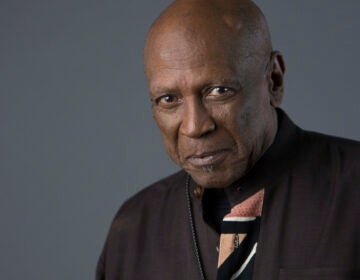Philly cabaret artist offers neighborly homage to Mr. Rogers
John Jarboe, the founder of Philadelphia's Bearded Ladies Cabaret, performs in the persona Mx. Rogers, a gender-fluid version of Fred Rogers.
Listen 3:18
John Jarboe portrays Mx. Rogers in the Bearded Ladies production "You Can Never Go Down the Drain," an homage to Fred Rogers and his children's program, "Mr. Rogers' Neighborhood." (The Bearded Ladies Cabaret)
“When I was very young, I had a dog that I loved very much. Her name is Mitzi. She got to be old, and she died,” confessed Fred Rogers in the 1970 “Death of a Goldfish” episode of “Mister Rogers’ Neighborhood.”
“When she died, I cried.”
One of the amazing things Fred Rogers did for children’s television was to be honest. His show may not have always been happy, but it was always sincere.
This year marks the 50th anniversary of “Mister Rogers’ Neighborhood.” A new documentary — “Won’t You Be My Neighbor?” — is in theaters now, and a feature film starring Tom Hanks is on the way.
In Philadelphia, cabaret artist John Jarboe is trying to do for drag what Rogers did for TV.
“Drag and cabaret is a space for permission, right? Let’s be loose, let’s really be ourselves by being someone else. I think Mr. Rogers is a space for permission of feelings,” said Jarboe in the dressing room of the Wilma Theater, where “You Can Never Go Down the Drain” runs for the next two weeks.
“Let’s acknowledge that sometimes we have bad thoughts and wish bad things. Isn’t it lovely that bad thoughts aren’t bad actions? That we can have bad thoughts and choose something else?” he said.
Jarboe, the founder of Philadelphia’s Bearded Ladies Cabaret, performs in the persona Mx. Rogers, a gender-fluid version of Fred Rogers.
One thing they share is a propensity for costume changes. But whereas Mr. Rogers opened every episode of his show by calmly changing into a cardigan and sneakers, Mx. Rogers begins “You Can Never Go Down the Drain” by frantically tearing through his closet looking for a dress to change into.
Jarboe wants to make it clear that he is not making fun of Mr. Rogers.
“The premise of the show is, do we need irony any more? Can we get back to earnestness?” he said. “Obviously, there’s a lot of failure. I can’t help but put in irony, a little shade in things.”
To keep his sneer in check, every audience member is given a small bell – it’s on the arm of every seat in the Wilma when they arrive. Whenever audience members feel Jarboe is being cynical, they are encouraged to ring the bell. At that point Jarboe will back up and redo whatever he just did, in a more earnest way.
Or, not.
“I had one audience member in New York, who was a little drunk, who kept ringing it the whole time,” he said. “I said, ‘You’re in time out, right now. You’re in a Mr. Rogers time out.’ I took away their bell.”
Jarboe takes the audience on an emotional journey through songs. Many are rearrangements of “Mister Rogers’ Neighborhood” classics, sometimes adding a little interpretive goose.
It’s you I like
It’s not the clothes you wear
It’s definitely not the way you do your hair (I don’t like that)
But it’s you I like.
Jarboe’s longtime musical collaborator, Heath Allen, also came up with songs written in a Rogers style, including the ditty to remind people to turn off their cell phones during the performance.
Don’t look at your phone
I’m here right now.
It’s isn’t fair –
I’m real and they are words in your phone.
I just want to be with you,
But you have to put down your phone.
When Jarboe got he idea for this show, he wasn’t looking at the calendar. The timing has nothing to do with the 50th anniversary of “Mister Rogers’ Neighborhood,” he said, but the election of Donald Trump.
He saw so much cynicism and sarcasm on stage after Trump took office that he wanted to do something more vulnerable and sincere. Jarboe said it’s made him a better singer.
“In drag and cabaret, we often do the opposite of Mr. Rogers. We use irony to point to the thing we’re all feeling but afraid to say,” he said. “Mr. Rogers just says the thing.”
WHYY is your source for fact-based, in-depth journalism and information. As a nonprofit organization, we rely on financial support from readers like you. Please give today.





